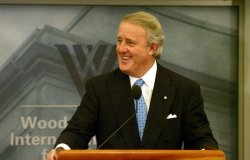<i>Benjamin Franklin: An American Life</i>
Overview
Benjamin Franklin: An American Life
A Book Launch with author Walter Isaacson
With author Walter Isaacson, President and CEO of the Aspen Institute
Benjamin Franklin (1706-1790) is perhaps the Founding Father best known for a pragmatic, down-to-earth approach to political philosophy and to the construction of the American republic. From the maxims of Poor Richard's Almanac to the irreverent humor of his Autobiography, Franklin's writings display his distaste for aristocracy and belief in the power of the middle class, both of which differentiated his outlook from that of many of his contemporaries. It was Franklin's ability to focus on the practical aspects of the task of writing a Constitution that enabled him to broker crucial compromises between small and large states and between North and South. It was the same ability to devise tactics as the occasion demanded that enabled him to persuade the French monarchy that its interests and those of the American revolutionaries were similar, gaining the colonies the crucial wartime support of France.
In discussing his Benjamin Franklin: An American Life during a program sponsored by the Division of United States Studies, Walter Isaacson presented Franklin as an American pragmatist. Needing income for his print shop, Franklin started a newspaper; needing to distribute it, he invented what became the U.S. postal system. Initially a monarchist, he came to view the British monarchy as incapable of treating its colonies fairly and, with regret, decided that the future lay along the path of revolution and independence. He went into the Constitutional Convention favoring a one-house legislature but, realizing that it was the only way to bring together the big states that wanted representation on the basis of population and the small states that insisted on equal representation of each state, argued for a two-house Congress. The pragmatism that illuminated his statesmanship during the Constitutional Convention had been honed during his career as a consummate diplomat in representing the interests first of the colonies and then of the new nation to the French and the British.
As did others of the Founding Fathers, Franklin wrestled with the issue of slavery. He began adulthood as a slave owner but soon freed his slaves, ordered his family to do the same, and eventually became the first president of the Pennsylvania Society for Promoting the Abolition of Slavery. His final public act was endorsing a petition to Congress recommending dissolution of the slavery system.
Franklin's enduring gift to the American people and their politics can most easily be summed up in his own words: he helped give the citizenry the framework of "a republic, if you can keep it," firmly believing that its success or failure had to be left to the people themselves. For a self-made man who began as a printer's apprentice and eventually became, in Isaacson's opinion, America's finest inventor, businessman, political philosopher, author, printer, diplomat and statesman, it was entirely in character for him to believe that people could and should be expected to make the most of opportunities given to them. In that, he was a supreme democrat.
Philippa Strum, Director of US Studies, 202-691-4129
Thank you for your interest in this event. Please send any feedback or questions to our Events staff.










